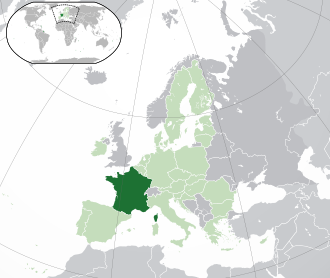France





Country in Western Europe
France (
]), officially the French Republic (French: République française ), is a country primarily located in Western Europe. It also comprises various overseas regions and territories. The metropolitan area of France extends from the Mediterranean Sea to the English Channel and the North Sea, and from the Rhine to the Atlantic Ocean. France borders Belgium, Luxembourg, Germany, Switzerland, Italy, Monaco, Spain, and Andorra.
History[edit]
The history of France dates back to the Iron Age, with the region being inhabited by the Gauls, a Celtic people. The area was annexed by Rome in the 1st century BC, leading to the establishment of the province of Gallia Narbonensis. The Franks, a Germanic people, established the Kingdom of France in the 5th century AD. The French Revolution in 1789 led to the establishment of the First French Republic.
Geography[edit]
France is the largest country in the European Union and has a diverse landscape that includes coastal plains, mountain ranges such as the Alps and the Pyrenees, and river systems like the Seine, Loire, and Rhône. The country has a varied climate, ranging from Mediterranean in the south to oceanic in the west and continental in the east.
Government and Politics[edit]
France is a unitary state with a semi-presidential system. The President of France is the head of state, while the Prime Minister is the head of government. The French Parliament is bicameral, consisting of the National Assembly and the Senate.
Economy[edit]
France has a mixed economy that combines extensive private enterprise with substantial state enterprise and government intervention. It is the world's seventh-largest economy by nominal GDP and the tenth-largest by purchasing power parity (PPP). Key industries include aerospace, automotive, luxury goods, and tourism.
Demographics[edit]
As of 2023, France has a population of approximately 67.4 million people. The official language is French, and the country is known for its cultural diversity. Major cities include Paris, Marseille, Lyon, Toulouse, and Nice.
Culture[edit]
France is renowned for its cultural heritage, including its art, literature, music, and cuisine. The country is home to numerous UNESCO World Heritage Sites, such as the Palace of Versailles, the Mont Saint-Michel, and the Louvre Museum.
Education[edit]
The French education system is highly centralized and organized into three stages: primary education, secondary education, and higher education. France is home to some of the world's leading universities and research institutions, such as the Sorbonne University and the École Normale Supérieure.
Health[edit]
France has a universal healthcare system that is largely financed by the government through a national health insurance program. The country is known for its high-quality healthcare services and medical research.
See also[edit]
References[edit]
<references group="" responsive="1"></references>
Ad. Transform your life with W8MD's Budget GLP-1 injections from $75


W8MD offers a medical weight loss program to lose weight in Philadelphia. Our physician-supervised medical weight loss provides:
- Weight loss injections in NYC (generic and brand names):
- Zepbound / Mounjaro, Wegovy / Ozempic, Saxenda
- Most insurances accepted or discounted self-pay rates. We will obtain insurance prior authorizations if needed.
- Generic GLP1 weight loss injections from $75 for the starting dose.
- Also offer prescription weight loss medications including Phentermine, Qsymia, Diethylpropion, Contrave etc.
NYC weight loss doctor appointmentsNYC weight loss doctor appointments
Start your NYC weight loss journey today at our NYC medical weight loss and Philadelphia medical weight loss clinics.
- Call 718-946-5500 to lose weight in NYC or for medical weight loss in Philadelphia 215-676-2334.
- Tags:NYC medical weight loss, Philadelphia lose weight Zepbound NYC, Budget GLP1 weight loss injections, Wegovy Philadelphia, Wegovy NYC, Philadelphia medical weight loss, Brookly weight loss and Wegovy NYC
|
WikiMD's Wellness Encyclopedia |
| Let Food Be Thy Medicine Medicine Thy Food - Hippocrates |
Medical Disclaimer: WikiMD is not a substitute for professional medical advice. The information on WikiMD is provided as an information resource only, may be incorrect, outdated or misleading, and is not to be used or relied on for any diagnostic or treatment purposes. Please consult your health care provider before making any healthcare decisions or for guidance about a specific medical condition. WikiMD expressly disclaims responsibility, and shall have no liability, for any damages, loss, injury, or liability whatsoever suffered as a result of your reliance on the information contained in this site. By visiting this site you agree to the foregoing terms and conditions, which may from time to time be changed or supplemented by WikiMD. If you do not agree to the foregoing terms and conditions, you should not enter or use this site. See full disclaimer.
Credits:Most images are courtesy of Wikimedia commons, and templates, categories Wikipedia, licensed under CC BY SA or similar.
Translate this page: - East Asian
中文,
日本,
한국어,
South Asian
हिन्दी,
தமிழ்,
తెలుగు,
Urdu,
ಕನ್ನಡ,
Southeast Asian
Indonesian,
Vietnamese,
Thai,
မြန်မာဘာသာ,
বাংলা
European
español,
Deutsch,
français,
Greek,
português do Brasil,
polski,
română,
русский,
Nederlands,
norsk,
svenska,
suomi,
Italian
Middle Eastern & African
عربى,
Turkish,
Persian,
Hebrew,
Afrikaans,
isiZulu,
Kiswahili,
Other
Bulgarian,
Hungarian,
Czech,
Swedish,
മലയാളം,
मराठी,
ਪੰਜਾਬੀ,
ગુજરાતી,
Portuguese,
Ukrainian
- Articles containing French-language text
- Pages using Lang-xx templates
- Articles with hatnote templates targeting a nonexistent page
- France
- Western Europe
- Countries in Europe
- European Union member states
- G7 nations
- G20 nations
- Member states of NATO
- Member states of the United Nations
- French-speaking countries and territories
- Republics
- Europe geography stubs
